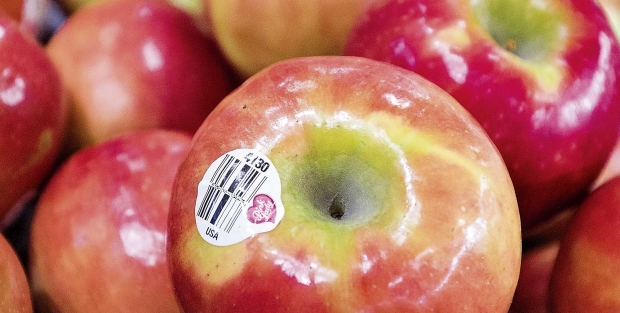
The Pink Lady trademark is said to be one of the first of its kind in the apple industry when it was finalized in the early 1990s. (TJ Mullinax/Good Fruit Grower)
Club varieties are generating excitement in the marketplace and handsome returns for growers.
But not every grower is a club member.
Scott McDougall, president of the Wenatchee, Washington, company McDougall and Sons, which holds an exclusive license to produce Ambrosia in the United States, said some growers who got involved with the managed varieties from the get-go have options when it comes to deciding what to plant. But growers who are not part of the clubs don’t have a lot of choices beyond the mainstream varieties.
“I feel there are a lot of growers on the outside looking in, and they’re somewhat limited to the commodity varieties,” he said.
He thinks that’s why there’s a lot of interest in the new Washington State University variety Cosmic Crisp (WA 38), which any grower in the state will be able to plant.
Plantings of most managed varieties are limited to the area that will produce the targeted production of the variety—a volume designed to create a controlled scarcity and maintain premium prices. So, latecomers might have difficulty getting in to those clubs.
ENZA, which manages the New Zealand varieties Jazz, Envy, and Pacific Rose, began recruiting growers in Washington to grow its varieties in the late 1990s and early 2000s. It has about 55 growers in Washington.
“We definitely don’t have a closed door policy,” said Chris Willett, quality control and packing manager with ENZA in Washington. “However, typically, our first priority is to grant existing growers first rights to plant additional volumes. Some of those growers have been in the program for a long time, and we’re rewarding them for their participation and giving them first rights.”
New growers have to be a good fit for the program. Their orchards must be in locations where they can produce high quality apples that will benefit the program, Willett said.
Target production of the varieties is adjusted over time to match demand on both the domestic and export markets, he said.
“We try to be a market-driven program and grow varieties that are in demand. In recent years, those numbers have gone up because there’s more interest in new varieties from the retailers as we move away from the traditional varieties. With more competition from other varieties, you try to compete and fill the shelf space as much as possible.”
Apple growers have received high prices for their fruit in the past few seasons, giving them access to capital for new plantings, so there’s been plenty of growth in the ENZA varieties from existing growers.
“We haven’t reached out to outside growers that much,” Willett said. “In recent years we’ve had a lot of demand for the varieties, but we want to make sure our growth is in a controlled and calculated manner and manage the demand and supply as effectively as possible.”
Risk
Stemilt Growers in Wenatchee has an exclusive U.S. license to pack and sell the Germany variety Pinova under the brand name Piñata. The variety is produced by some of the company’s outside growers as well as on company orchards, but the volume is limited to match demand.
“You just don’t want it to flood the market,” said Stemilt’s communications manager Brianna Shales. Each variety has a certain volume that can be shipped in a specific window, “and if you go beyond that, then the price starts to not be as good. And that’s why growers grow it, because they want to make more money.”
Many of the growers producing it were early adopters of the variety, but not every grower wants to grow Piñata, she said, because it can be more difficult to grow than the more familiar varieties.
Some growers don’t have suitable locations, and the amount of risk that growers are willing to take by investing in a new variety also varies. When varieties are launched, there is often a lack of information on how they will perform in commercial-scale plantings.
The cost of establishing an orchard can be anywhere from $30,000 to $50,000 per acre, depending on the trees, irrigation system, and trellis configurations. In addition, growers have to pay tree royalties and sometimes franchise fees and production royalties on proprietary varieties.
Tom Auvil, research horticulturist with the Washington Tree Fruit Research Commission, believes there are not many growers producing the very high-value club varieties currently in production, but there will be more varieties in the future. Most major grower-packers have exclusive varieties and they’re looking for more.
“It’s amazing to me to see how hard the packer companies are working at traveling around the world looking for better cherry and apple varieties,” Auvil said. “People are going a lot of places looking for a lot of things.”
He said growers will need to work with packers so they’re able to plant the new varieties.
“I think folks just have to make those contacts and those relationships to see what’s available,” he said. •






Leave A Comment